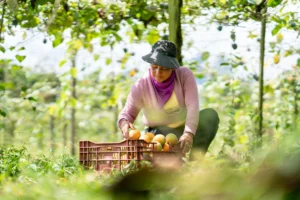In April 2020, the USDA announced it would use funds and authority under the Families First Coronavirus Response Act and the Coronavirus Aid, Relief, and Economic Security Act (CARES Act) as well as other existing USDA funding to launch a new $19 billion federal program, called the Coronavirus Food Assistance Program (CFAP). The USDA designated $3 billion of CFAP funding to the Farmers to Families Food Box Program (Program) to purchase and distribute fresh produce, dairy, and meat. The Program aimed to address some of the supply chain and market disruptions in the agriculture and food service industries resulting from the pandemic. Through this Program, the Agricultural Marketing Service (AMS) of the USDA contracted with farms, farmer associations, distributors, and other value chain entities to purchase agricultural products from farmers and processors and for those contracted entities to distribute this food to nonprofit entities, such as food banks and faith-based organizations, to serve Americans in need.
Today, we released An Evaluation of the Farmers to Families Food Box Program, which provides an in-depth analysis of the Program that celebrates its successes, analyzes its critiques, and provides recommendations on areas of opportunity for improvement.
The report is designed to provide the USDA with an analysis of the Program and to offer recommendations on how to improve its effectiveness. Our analysis focuses on three specific goals the Program was set up to tackle: support of farmers, specifically small- and mid-sized and minority- and women-owned farms; alleviation of food insecurity; and mitigation of food waste. Most of the recommendations herein are strategies the USDA can use to adjust the Program, should it continue beyond the conclusion of Round Five in April 2021, or be a model for the future. Also included are recommendations to both the USDA and Congress to further address food waste, food insecurity, and the support of small- and mid-sized and minority- and women-owned farms beyond the scope of the Program, in a post-pandemic world.
The full report can be viewed at: http://chlpi.flywheelsites.com/farmerstofamiliesreport. An executive summary can be viewed at: http://chlpi.flywheelsites.com/farmerstofamiliesexecsummary.


Food Law & Policy, Commentary
Policy to Reduce Methane Emissions and Feed More People
April 3, 2025